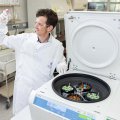A University of Queensland researcher has received a four-year $3.9million grant to establish an Australian arm of an international bowel cancer registry.
The Pathology Department's Professor Jeremy Jass said the US-based National Institutes of Health (US) grant would fund centres in Brisbane, Perth, Adelaide, Sydney, Newcastle, Melbourne and Auckland.
Professor Jass, who took up his position with the University 18 months ago, has already established the Queensland Bowel Cancer Family Registry, supported by the University and the Queensland Cancer Fund.
The first meeting of the co-ordinated registries was held in Baltimore last week.
Professor Jass said research in the 1980s had proved genes were responsible for a form of cancer of the bowel known as familial colorectal cancer (CRC) although this was not 'totally accepted' by the medical profession until the 1990s.
'CRC encompasses distinct syndromes in which there is a well-defined inherited genetic basis as well as families showing clustering of CRC that is without a known genetic cause,' he said.
'The two most important known syndromes are familial adenomatous polyposis (FAP) and hereditary non-polyposis colorectal cancer (HNPCC) and both are inherited as autosomal dominant traits.
'The main aim of this study is to collect information and samples from a very large number of families and try to answer a number of questions about the forms of hereditary cancer we already understand and those we don't yet know about.'
Professor Jass said some families with a strong history of bowel cancer would qualify for gene screening.
'At one end of the bowel cancer spectrum there are very powerful genes and if family members have them it is almost inevitable they will develop bowel cancer,' he said.
Professor Jass said until all family members underwent genetic screening they should have regular bowel examinations through colonoscopy.
'Once we have screened for the gene we can change that 50 percent chance of developing bowel cancer to either no chance, or 100 percent,' he said.
'But the good news is that you can actually do something about bowel cancer. Using colonoscopy we can either prevent the cancer from occuring in the first place or detect it in the early stages when it is completely curable.'
Professor Jass said the study would build on existing clinical frameworks to provide a network of registry co-ordinators and support services for families.
'The reason we decided to go Australia-wide is because families are never within just one state. Often large families will have members spread throughout the country so there is a need for collaboration,' he said.
'It takes a lot of input to gather this kind of information, much of it is buried in old records and it is often a subject family members haven't talked about.
'But families are remarkably co-operative and often they are the ones who realise something is going on, where the medical profession has been slow to accept the genetic link.
'One very large family in New Zealand, whose members had a high incidence of bowel cancer, and at a young age, was told by their GPs it was not hereditary.
'Our families are very happy to find someone who will support them and who are working for them on a long-term basis.'
Professor Jass has been researching genetic bowel cancer since 1984 and was one of an international team including America, Canada and Finland, involved in the discovery of Hereditary Non-Polyposis Colorectal Cancer genes.
The NIH study team includes gastroenterologist Dr Barbara Leggett (Royal Brisbane Hospital), Dr Joanne Young (RBH), Dr Georgia Chenevix-Trench (Queensland Institute of Medical Research), Dr Mike Gattas (Queensland Clinical Genetic Service) and registry co-ordinator Sonja Webb.
For more information contact Professor Jeremy Jass on (telephone 07 3365 5340)



